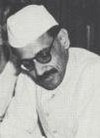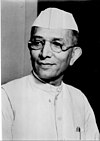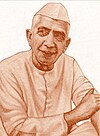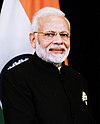The Prime Minister of India is the chief executive of the Government of India. In India’s parliamentary system, the Constitution names the President as head of state de jure, but his or her de facto executive powers are vested in the prime minister and their Council of Ministers. Appointed and sworn-in by the President, the prime minister is usually the leader of the party or alliance that has a majority in the Lok Sabha, the lower house of Parliament of India.
Since 1947 India has had 14 prime ministers, 15 including Gulzarilal Nanda who twice acted in the role, of which 6 having at least one full term, ruling country for about 60 years. The first was Jawaharlal Nehru of the Indian National Congress party, who was sworn in on 15 August 1947, when India gained independence from the British Raj. Serving until his death in May 1964, Nehru remains India’s longest-serving prime minister. He was succeeded by fellow Congressman Lal Bahadur Shastri, whose 1 year 7-month term also ended in death. Indira Gandhi, Nehru’s daughter, succeeded Shastri in 1966 to become the country’s first woman prime minister. Eleven years later, she was voted out of power in favour of the Janata Party, whose leader Morarji Desai became the first non-Congress prime minister. After he resigned in 1979, his former deputy Charan Singh briefly held office until Indira Gandhi was voted back six months later. Her second stint as prime minister ended five years later on 31 October 1984, when she was assassinated by her own bodyguards. Her son Rajiv Gandhi was then sworn in as India’s youngest premier and the third from his family. Members of Nehru–Gandhi family have been prime minister for a total of 37 years and 303 days.
Rajiv’s five-year term ended with his former cabinet colleague, Vishwanath Pratap Singh of the Janata Dal, forming the year-long National Front coalition government in 1989. A seven-month interlude under prime minister Chandra Shekhar followed, after which the Congress party returned to power, forming the government under P. V. Narasimha Rao in June 1991. Rao’s five-year term was succeeded by four short-lived governments—Atal Bihari Vajpayee from the Bharatiya Janata Party (BJP) for 13 days in 1996, a year each under United Front prime ministers H. D. Deve Gowda and Inder Kumar Gujral, and Vajpayee again for 19 months in 1998–99.After Vajpayee was sworn-in for the third time, in 1999, he managed to lead his National Democratic Alliance (NDA) government to a full five-year term, the first non-Congress alliance to do so. Vajpayee was succeeded by Manmohan Singh, whose United Progressive Alliance government was in office for 10 years between 2004 and 2014. The incumbent prime minister of India is Narendra Modi who has headed the BJP-led NDA government since 26 May 2014, is India’s first non-Congress single party majority government. In August 2020, Modi became India’s longest serving non-Congress Prime Minister.
List
|
- Legend
-
Acting prime minister
| BJP (2) INC/INC(I)/INC(R) (6+1 acting) JD (3) JP (1) JP(S) (1) SJP(R) (1) | |||||||||||
|---|---|---|---|---|---|---|---|---|---|---|---|
| No. | Portrait | Name(Birth–Death) | Constituency | Party (Alliance) |
Term of office | Lok Sabha | Ministry | Appointed by | |||
| 1 |  |
Jawaharlal Nehru (1889–1964) |
Phulpur, Uttar Pradesh | Indian National Congress | 15 August 1947 | 15 April 1952 | 16 years, 286 days | Constituent Assembly | Nehru I | The Earl Mountbatten of Burma | |
| 15 April 1952 | 17 April 1957 | 1st | Nehru II | Rajendra Prasad | |||||||
| 17 April 1957 | 2 April 1962 | 2nd | Nehru III | ||||||||
| 2 April 1962 | 27 May 1964† | 3rd | Nehru IV | ||||||||
| Acting |  |
Gulzarilal Nanda (1898–1998) |
Sabarkantha, Gujarat | Indian National Congress | 27 May 1964 | 9 June 1964 | 13 days | Nanda I | Sarvepalli Radhakrishnan | ||
| 2 |  |
Lal Bahadur Shastri (1904–1966) |
Allahabad, Uttar Pradesh | Indian National Congress | 9 June 1964 | 11 January 1966† | 1 year, 216 days | Shastri | |||
| Acting |  |
Gulzarilal Nanda (1898–1998) |
Sabarkantha, Gujarat | Indian National Congress | 11 January 1966 | 24 January 1966 | 13 days | Nanda II | |||
| 3 |  |
Indira Gandhi (1917–1984) |
Rajya Sabha MPfor Uttar Pradesh | Indian National Congress | 24 January 1966 | 4 March 1967 | 11 years, 59 days | Indira I | |||
| Rae Bareli, Uttar Pradesh | Indian National Congress (R) | 4 March 1967 | 15 March 1971 | 4th | |||||||
| 15 March 1971 | 24 March 1977 | 5th | Indira II | V. V. Giri | |||||||
| 4 |  |
Morarji Ranchhodji Desai (1896–1995) |
Surat, Gujarat | Janata Party | 24 March 1977 | 28 July 1979 | 2 years, 126 days | 6th | Desai | B. D. Jatti (acting) |
|
| 5 |  |
Chaudhary Charan Singh (1902–1987) |
Baghpat, Uttar Pradesh | Janata Party (Secular) | 28 July 1979 | 14 January 1980 | 170 days | Charan | Neelam Sanjiva Reddy | ||
| (3) |  |
Indira Gandhi (1917–1984) |
Medak, Andhra Pradesh | Indian National Congress (I) | 14 January 1980 | 31 October 1984† | 4 years, 291 days | 7th | Indira III | ||
| 6 |  |
Rajiv Gandhi (1944–1991) |
Amethi, Uttar Pradesh | Indian National Congress (I) | 31 October 1984 | 31 December 1984 | 5 years, 32 days | Rajiv | Zail Singh | ||
| 31 December 1984 | 2 December 1989 | 8th | |||||||||
| 7 |  |
Vishwanath Pratap Singh (1931–2008) |
Fatehpur, Uttar Pradesh | Janata Dal (National Front) |
2 December 1989 | 10 November 1990 | 343 days | 9th | Vishwanath | R. Venkataraman | |
| 8 |  |
Chandra Shekhar (1927–2007) |
Ballia, Uttar Pradesh | Samajwadi Janata Party (Rashtriya) with INC(I) |
10 November 1990 | 21 June 1991 | 223 days | Chandra Shekhar | |||
| 9 |  |
Pamulaparthi Venkata Narasimha Rao (1921–2004) |
Nandyal, Andhra Pradesh | Indian National Congress (I) | 21 June 1991 | 16 May 1996 | 4 years, 330 days | 10th | Rao | ||
| 10 |
 |
Atal Bihari Vajpayee (1924–2018) |
Lucknow, Uttar Pradesh | Bharatiya Janata Party | 16 May 1996 | 1 June 1996 | 16 days | 11th | Vajpayee I | Shankar Dayal Sharma | |
| 11 |  |
Haradanahalli Doddegowda Deve Gowda (1933–) |
Rajya Sabha MPfor Karnataka | Janata Dal (United Front) |
1 June 1996 | 21 April 1997 | 324 days | Deve Gowda | |||
| 12 |  |
Inder Kumar Gujral (1919–2012) |
Rajya Sabha MPfor Bihar | Janata Dal (United Front) |
21 April 1997 | 19 March 1998 | 332 days | Gujral | |||
| (10) |  |
Atal Bihari Vajpayee (1924–2018) |
Lucknow, Uttar Pradesh | Bharatiya Janata Party (NDA) |
19 March 1998 | 10 October 1999 | 6 years, 64 days | 12th | Vajpayee II | K. R. Narayanan | |
| 10 October 1999 | 22 May 2004 | 13th | Vajpayee III | ||||||||
| 13 |  |
Manmohan Singh (1932–) |
Rajya Sabha MPfor Assam | Indian National Congress (UPA) |
22 May 2004 | 22 May 2009 | 10 years, 4 days | 14th | Manmohan I | A. P. J. Abdul Kalam | |
| 22 May 2009 | 26 May 2014 | 15th | Manmohan II | Pratibha Patil | |||||||
| 14 |  |
Narendra Damodardas Modi (1950–) |
Varanasi, Uttar Pradesh | Bharatiya Janata Party (NDA) |
26 May 2014 | 30 May 2019 | 6 years, 316 days | 16th | Modi I | Pranab Mukherjee | |
| 30 May 2019 | Incumbent | 17th | Modi II | Ram Nath Kovind | |||||||
| No. | Portrait | Name(Birth–Death) | Constituency | Party (Alliance) |
Term of office | Lok Sabha | Ministry | Appointed by | |||
Statistics
- List of prime ministers by length of term
| No. | Name | Party | Length of term | |
|---|---|---|---|---|
| Longest continuous term | Total years of premiership | |||
| 1 | Jawaharlal Nehru | INC | 16 years, 286 days | 16 years, 286 days |
| 2 | Indira Gandhi | INC/INC(I)/INC(R) | 11 years, 59 days | 15 years, 350 days |
| 3 | Manmohan Singh | INC | 10 years, 4 days | 10 years, 4 days |
| 4 | Narendra Modi | BJP | 6 years, 316 days | 6 years, 316 days |
| 5 | Atal Bihari Vajpayee | BJP | 6 years, 64 days | 6 years, 80 days |
| 6 | Rajiv Gandhi | INC(I) | 5 years, 32 days | 5 years, 32 days |
| 7 | P. V. Narasimha Rao | INC(I) | 4 years, 330 days | 4 years, 330 days |
| 8 | Morarji Desai | JP | 2 years, 126 days | 2 years, 126 days |
| 9 | Lal Bahadur Shastri | INC | 1 year, 216 days | 1 year, 216 days |
| 10 | Vishwanath Pratap Singh | JD | 343 days | 343 days |
| 11 | Inder Kumar Gujral | JD | 332 days | 332 days |
| 12 | H. D. Deve Gowda | JD | 324 days | 324 days |
| 13 | Chandra Shekhar | SJP(R) | 223 days | 223 days |
| 14 | Charan Singh | JP(S) | 170 days | 170 days |
| Acting | Gulzarilal Nanda | INC | 13 days | 26 days |
- Timeline

- List by party
| No. | Political party | Number of Prime ministers | Total years of holding PMO |
|---|---|---|---|
| 1 | INC/INC(I)/INC(R) | 6+1 acting | 54 years, 123 days |
| 2 | BJP | 2 | 13 years, 25 days |
| 3 | JD | 3 | 2 years, 269 days |
| 4 | JP | 1 | 2 years, 126 days |
| 5 | SJP(R) | 1 | 223 days |
| 6 | JP(S) | 1 | 170 days |
- Parties by total duration (in years) of holding Prime Minister’s Office
- INC/INC(I)/INC(R)
- BJP
- JD
- JP
- JP(S)
- SJP(R)
Living former Prime ministers
As of 7 April 2021, there are two living former Prime ministers of India:
- Living former Prime ministers
-

H. D. Deve Gowda(1996–1997)
May 18, 1933 -

Manmohan Singh
(2004–2014)
September 26, 1932
The most recent death of a former Prime Minister was that of Atal Bihari Vajpayee on 16 August 2018, aged 93.
